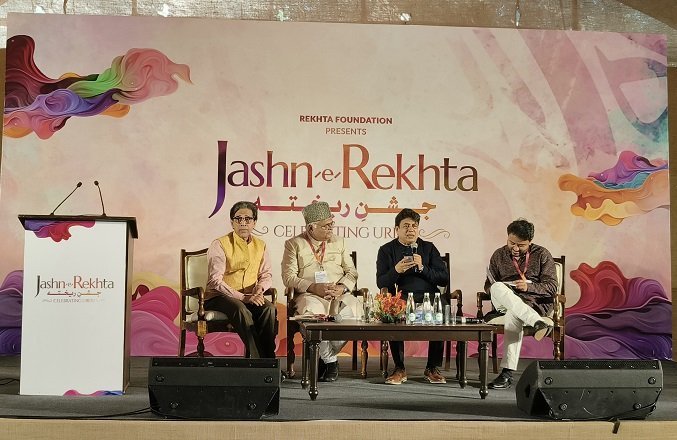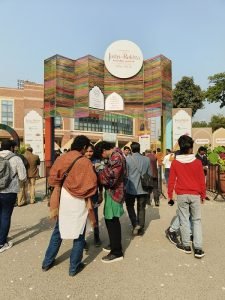
The eighth edition of Jashn-e-Rekhta, the festival that celebrates all facets of Urdu through various art forms, was held from 8 – 10 December at Major Dhyan Chand National Stadium in New Delhi. The festival is dedicated to the preservation and promotion of Urdu language and literature and Awadhi culture.
This year’s festival had a session on ‘Tarjuma: Haasil aur La-Haasil‘ (Lost and Found in Translation) on 9 December 2023. Renowned Urdu translators Yaqoob Yawar, Ather Farooqui, and A Naseeb Khan debated on the growing demand of Urdu translations and the nuances of Awadhi culture and etiquette that sometimes go missing in such works. The session was moderated by Maaz bin Bilal, translator of Temple Lamp – Verses on Banaras by Mirza Ghalib.
Ather Farooqui has done a number of translations from Urdu to English and vice-versa. He was awarded the Sahitya Akademi Award for the translation of the play Sons of Babur in Urdu as Babur ki Aulad. He has translated The Life and Poetry of Bahadur Shah Zafar by Aslam Parvez into English, The Last Gathering – the English translation of Munshi Faizuddin’s Bazm-i Aakhir, and Sawaneh-i Dehli, or the Biography of Delhi, a first-hand account of life on the streets of Delhi written by Mirza Ahmad Akhtar Gorgani.
Yaqoob Yawar has been a professor of Urdu at Banaras Hindu University (BHU) and has done over 40 translations of English books to Urdu, which includes books of authors Sigmund Freud, Gabriel García Márquez, and Agatha Christie. He is the author of Dilmun: A Novel Based on Indus Valley Civilization. A Naseeb Khan has also done many English-to-Urdu and Urdu-to-English translations.
Bilal started the panel discussion with the Italian saying ‘Traduttore, traditore’, which translates into the translator being a traitor. Farooqui said the process of translation should be done correctly and the translator should stay true to the essence of the original work. Yawar said those translating from Hindi to Urdu don’t face many difficulties. But translating from languages such as English, French, and Spanish takes a lot of work and the translators need to read the work multiple times to give the reader a clear picture of what the author wants to say.
Yawar took the example of Dan Brown’s Langdon series from which he has translated three books into Urdu. He said the series describes the Vatican City in great detail, including the Vatican library, and the city’s corners and churches. The translator, he said, needs to describe the city in the same detail for the same feel. Many foreign language translators such as those translating from German or French into Urdu prefer to translate from the English translations of the book and, as a result, a lot gets lost in the process of tarjuma (translation).

A Naseeb Khan said he had translated several books into English, including Ghalib’s works and Khalil Jawed’s Maut ki Kitaab. He said translations are fluid and dynamic and the Murtazim (translator) is a traitor in several religious and cultural connotations. He said the translations need to be done in such a way that the translated work is free from mistakes and the target readers can comprehend and appreciate the text. He said there is no authority to check the authentication of translated works in Urdu literature.
The main point of translation, Khan said, is to make the original work accessible to the masses. Khushwant Singh has done a great job of translating Urdu poetry and ghazals, which can be confusing and obtuse to translate. While the translation of modern Urdu poetry is relatively easy, short stories have some frozen expressions and idioms that can be difficult. Sometimes, the meaning of individual words has to be sacrificed in the context of the whole text. The English language also does not differentiate between the terms aap, tum and tu, which makes it difficult to retain the original essence of the work.
He went on to appreciate the English translation The Paradise of Food of Khalil Jawed’s Nemat Khana by Baran Farooqi, which won the 2022 JCB Prize for Literature. However, he felt there is a general lack of appreciation for Urdu translators and they are not well-recognized.
Khan felt translators should perform a scholarly appreciation of the text by reading it again and again and making an effort to look at the target reader while looking at the original writer. The literary canon of translators, thus, needs to learn from each other’s culture rather than dwell on the challenges posed by translations.
Yawar started translating books in 1980 and has since then translated 25-26 novels and 13-14 non-fiction titles. He said he devotes two months for each translation, which does not include the time he takes to read the book – sometimes as many as 6-7 times as each reading unearths new layers.
He described how he translates the work paragraph by paragraph, taking into account how an Urdu writer would choose to write it. This method helps him to comprehend the meaning of the text in a much more nuanced manner. He said he has faced some criticism over his style of translating, but feels that it conveys the overall meaning of the work more elegantly, with a flavor of the Awadhi language and culture, which is starkly missing in word-to-word translations.
The session delved into the growth of Hindi to Urdu translations. All panelists agreed that everyone who knows Urdu in India knows Hindi as well, so there is not much scope for readership for this genre. However, there is an increasing demand for Urdu translations of popular Hindi works in neighboring Pakistan where people are interested in Hindi literature. An example Farooqui took was the growing popularity of the Urdu translation of Geetanjali Shree’s Booker Prize-winning Ret Samadhi by Asther Ahmed. Yakoob said publishers in India are printing as low as 100-200 copies of Urdu translations, which proves the readership of Hindi to Urdu translations is mostly outside the country.
Lastly, Bilal talked about the amount of research that went into his translation of Temple Lamp – Verses on Banaras by Mirza Ghalib. He read all other translations of Ghalib’s verses on Banaras, including the ones by A K Nijhawan in Hindi and English, Sajid in Hindi, and Zoya Ansari in Hindi, and has given references to these in his text. He reached out to many scholars in Jamia Millia Islamia, JNU, and Delhi University for assistance in his research. He reached out to libraries to gain access to the original as well as translated texts and tried to retain the rhythm of the verses in English.

















